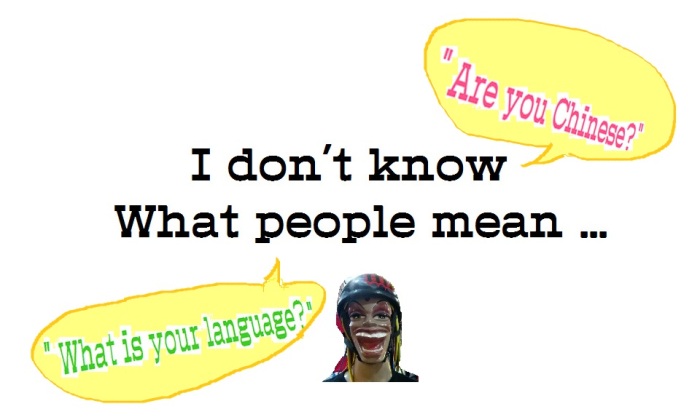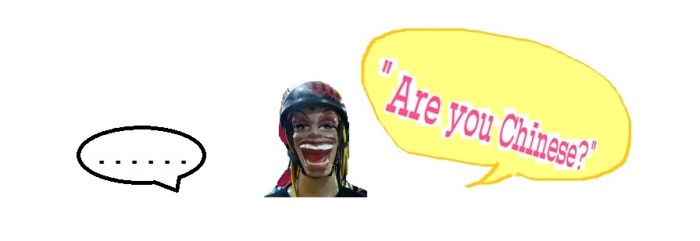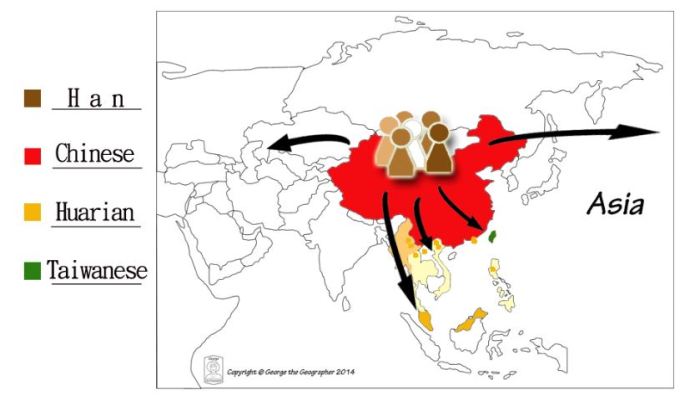Coming to Thailand so far, I’ve been lost some times for self-identification. When it comes to the word “Chinese,” I would say, for me, it’s a scary word in English language. Is that because of discrimination? No. Is it because of a feud? Not really. Or is it a legacy of hatred? No, no, no. So, why it is such a horrible word?
In the past two months, I have been asked about these questions:
- “What is your mother tongue?”
- “What is the difference between Mandarin and Chinese?”
- “Is Taiwanese the same as Chinese?”
- “Are you Chinese?” …,
These are common questions or greetings when meeting new people, but, most of the time, my answers (or answers in mind) are unsure:
- “Mandarin.”
“Okay, Chinese.” - “Ahhh…”
“Chinese includes Mandarin…” - “Different.”
“Ahh? Do you mean the languages or people?”
“Anyway, both different.” - “Yes.”
“Ahhh… no.”
“Ahhh…what”
This is why I said, the English word “Chinese” is horrible for me, because

I, seriously, don’t know how to response these questions when meeting new friends. Many friends like me don’t know either.
So, could you help us find out an answer? How should we response? If you don’t really understand what situation we are confronted with, you may try to answer a question like this ↓
Q. Which picture is closest to your mind when it comes to word “CHINESE” ?
[ These are the results as I typed “Chinese” via Google search engine.]
If your answer is (1) People, do you think it’s the people from Mainland China (People’s Republic of China), or the people of the yellow race, or somewhere else?
If your answer is (2) Language, is it the spoken language, or written characters? If it’s spoken language, do you prefer to hear Chinese or Mandarin if our mother tongue is Mandarin? If it is written character, do you know there are Simplified Chinese and Traditional Chinese?
If your answer is (3) Culture, is it about food, festival, drama, custom, traditional architecture, all of the fore-mentioned, or anything else?
If you have (4) no idea about this question, please jump to the button of this page!
This might happen due to different “cultural register”, so I believe the confusion happens to not only “Chinese” but also other languages. Similarly, the point has long been a challenging question since my first time being asked.
So here again, for those people who DON’T speak Chinese language, What do you usually or possibly mean when asking an Asian look person “(Are you) Chinese???” I would be appreciated for any comments below or response!

BUT, if you still DON’T understand why I am confused and scared of this word Chinese, let’s have more insights into word Chinese in “Chinese” language itself.
Based on the P-E-O-P-L-E, there are some words similar but different, commonly used in “Chinese” language:
↓ Chinese Character (Pinyin) | Literal meaning : word description
∈ 漢人 (Han-ren)| the main ethnic group of people in East Asia.
Φ 中國人 (Zhong.Guo-ren)| People of Central Country (China): the offspring of dragon; generally as well as the people cultivated by Confucianism, taught with humble, benevolent and moderate attitude descending from thousands of years, used to be “the Chinese” as everybody knows. Its historical culture, is generally known as “Hua-xia Culture (華夏文化)” or “Zhong-hua Culture” (中華文化).
Ω 大陸人 (Dalu-ren)| People from Mainland China, or the citizen of China, is also the group who nowadays call themselves “the Chinese” – Therefore, “Chinese” in modern Chinese language, has an alternative term as Daluren, mainly means people from Mainland China.
⊕ 華人 (Hua-ren)| People of Hua-xia Culture: the ethnic Chinese people descended and named after Hua-Xia Culture, have been traveling or living outside of China since a long time ago. They are now mainly in Malaysia, Singapore, Hong Kong, Taiwan, Vietnam, Myanmar, USA, and so on.
- In this article, let’s call them Huarian to make it clearer.

However, no matter it is Han People, the ethnic Chinese people, People in Mainland China, or Hua People, the Huarian, as they are translated into English, they are equally “CHINESE“.
Apparently, in order to distinguish the differences between an ethnic people under different cultural background, different words have been created and used for decades with the rapid change of global development.
So, for the ethnic Chinese people in these countries, you may call them:
- Hong Kong – Hong Konger, Hong Kongese, or Huarian
- Taiwan – Huarian, Taiwanese (including all races in Taiwan), or Han-ren
- Singapore, Malaysia – Huarian
- Chinese American – Huarian
You might think, “It’s your business. Why do I need to know?” To be honest, I agree with that. But when I know more people from other countries in the world, I noticed some similar situations happen to different culture too.
- “British style is cool.””Um, I think this is our Scottish culture.”
- “Where are you from?” “USA.” “Huh?” “America.””Ohh!”
- “Are they Russians?” “No, they are from Czech Republic.”
- “Korean?” ” Japanese.”
There is nothing wrong because no one is supposed to know everything. However, do you like those feelings? I don’t really think so. Then, that’s the point why you may try to pay attention when meeting up new friends from a different culture. Sometimes a changing use of language can break ice and make a relationship closer.
EXERCISE

ANSWERS

Now, you may like to know how to greet people properly by showing your manner and respect if they are NOT from Mainland China. I promise they will respect you for your sense and horizon.
*Note: The exercise is only a rough classification, based on my personal point of view and experience. I think it worth referring to but it doesn’t stand for everyone’s identification.
Next, let’s look into a complex but actually not so difficult part – “Chinese Language“
So based on family of Chinese language, there are:
- Spoken Languages
- Han language (漢語/漢文): from Sino-Tibetan language, the main Chinese system base, could be regarded as the idea of Germanic or Latin languages here.
- National language (國語): the term used in Taiwan, to distinguish Taiwanese dialects.
- Hua language (華語/華文): the term generally used by countries whose people speak Han language but their official language is usually not (only) Chinese. (Ex. Singapore and Malaysia)
- Central Language (中文): generally the same word as word Chinese in English, which includes all oral Han language and written characters.
- Han character (漢字): generally known as today’s Chinese characters
- Traditional Chinese Script (繁體中文字) – used in only Taiwan and Hong Kong
- Simplified Chinese Script (簡體中文字|简体中文字) – mainly used in China, Singapore, and Malaysia
- Japanese Kanji (日本漢字|日本語の漢字)
- Korean Hanja (朝鮮漢字|한자)
Examples of Simplified & Traditional Chinese Script
-
Standard Chinese (現代標準和語) (Ref: WikiPedia: Standard Chinese)
- Official Language in
- China, Macau, Hong Kong, Taiwan, and Singapore
- Known as
- Chinese and Mandarin (WikiPedia : List of Official Languages)
- Relationship: (WikiPedia: Standard Chinese)
- Sino-Tibetan
- Chinese
- Mandarin
- Beijing dialect
-
Standard Chinese
-
- Beijing dialect
- Mandarin
- Chinese
- Sino-Tibetan
- Official Language in
- WHAT? WHAT? WHAT?
- Apparently Wikipedia is in the same trouble as me 😀 ???

I believe when people say “Chinese“, they usually mean the Standard Chinese. The Standard Chinese is exactly my mother tongue. However, I also know the blue CHINESE covers all of these languages, so when I introduce myself I come from Taiwan, and you next ask me “Do you speak Chinese?” It is always like a sudden Rashomon in my mind, do you mean “CHINESE“or “CHINESE“? Then, I usually shut down, not knowing how to response.
So here, I have a few suggestions and opinions.
Based on my observation and experience, a non-Chinese speaker usually says “Chinese” or “Mandarin” to refer to the Standard Chinese. Now that “Chinese” is repeated and makes confusion between Standard Chinese and the family of Chinese languages, using “MANDARIN” might help!
Conclusion –
Next time when you ask people “Do you speak Chinese?” but he or she hesitates, don’t hesitate to add up “I mean Mandarin.” This especially helps when you have introduced yourselves and know your friend is from Taiwan or they are Huarian people from other countries. Even if they don’t speak Mandarin, they would understand and tell you what language they speak.
For example –
- In general condition,
- Hong Kong People – Cantonese (Yueyu / Guangdong hua)
- Hurian from Singapore – English, Mandarin, Hokkien
POST DISCUSSION
Huarian?
Chinan?
Taiwanian?
➖➖➖➖➖➖➖➖➖➖➖➖➖➖➖
∈ 漢語 (Han Language) > 華語 (Hua Language) > 中文 (Official Chinese) > 北京官話 (Mandarin) >
???
大陸人 Dalu-ren || Citizen of the US | People living in England ||
華人 Hua-ren | All kinds of early immigrants in the US || Group
漢人 Han-ren | Aryan | Native American | Caucasian || Race
Chinese|| American | Hong Kongger | New Yorker |
Chinese|| British English | Japanese | Argenrtian Spanish | Mandarin |
Chinese|| African | British | Mexican | Caucasian | Native American
高加索白人
This is how people “tend to” group up people with their “impression”, instead of the classisification based on biology.
In terms of language
We have ∂ 漢語, 華語, 北京官話,
Up to here, I am happy to introduce myself again.

- In terms of language, how would you define “Chinese” ?
- In terms of people, how would you define “Chinese” ?
- In terms of culture, how would you define “Chinese” ?




Thank you for sharing this interesting story here. Now I’m more interested in your culture. I’m looking forward your more analyzing. Thx :))))
LikeLike
This was a very interesting read! To answer your first question, when I hear the word ‘Chinese’ I think about the culture and the food. The reason I think this is because in the US there isn’t a large amount of Chinese or Asian culture, so all we can really picture is food because that is all we have as examples. And for me personally, when I ask someone is they speak Chinese, I mean standard Chinese, not a brach of the language. Next time some one asks you if you speak Chinese, you could yes, but I speak a language that is a Chinese. That might make things a bit more understanding! Hopefully this helps!
LikeLike